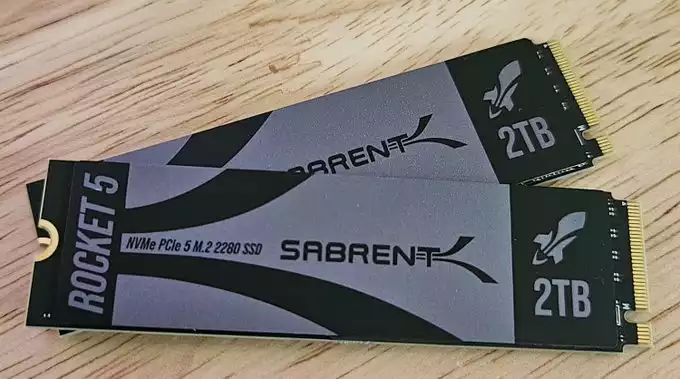Aside from the significant increase in sequential throughput speeds, the one thing that the latest PCIe Gen 5 SSDs have in common is the need for strong active cooling, comparable to the RTX 4090. Well, almost. But the new Sabrent Rocket 5 is different; Sabrent believes that the slim cooling covers that come with the M.2 slots on most motherboards are sufficient.
If true, this is especially impressive given that the new Rocket 5 not only uses the same Phison E26 controller chip as the majority of existing Gen 5 drives, but also tends to have huge heat sinks and require active cooling impressive. It is also one of, if not the fastest, of the Gen 5 drives.
Sabrent claims 14GB/s read and 12GB/s write for both the 2TB and 4TB models of this drive; the 1TB model is 13GB/s read and 9.5GB/s write. In fact, Sabrent's own tests show that the drive performs slightly better than 14GB/sec on CrystalDiskMark and closer to 13GB/sec on read.
In theory, the PCIe Gen 5 specification allows up to 16GB/s assuming a quad-lane interface; some Gen 5 drives with the E26 controller only reach 10GB/s, including the Seagate FireCuda 540. Aside from firmware optimizations, the speed difference is primarily due to the specifications of the NAND flash used in the drive.
Early Gen 5 drives used 1600 MT/s flash chips and had a performance ceiling of around 10 GB/s. 2000 MT/s NAND has since improved this to 12 GB/s or thereabouts. Now, Sabrent (via Anandtech) is the first to deploy 2400 MT/sec NAND and may achieve 14GB/sec.
Of course, one could argue that it is not peak sequential throughput that is more important, but random access. Again, Rocket 5 is quite impressive, achieving 1.4 million IOPS in both directions.
In fact, according to CrystalDiskMark figures published by Sabrent, it reaches just over 100 MB/sec for 4K reads and 500 MB/sec for 4K writes.
In systems without a cooling slave bundled with the M.2 slot, the idea that Rocket 5 does not require fairly intensive cooling is somewhat undermined, as Sabrent bundles a fairly large active cooler with the drive anyway.
In any case, the Rocket 5 should be available fairly soon, although pricing has not yet been announced. Hopefully we'll be able to get one for testing soon, with oven gloves at the ready, just in case.


Comments